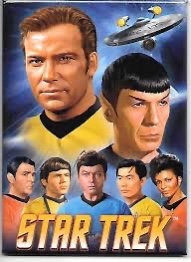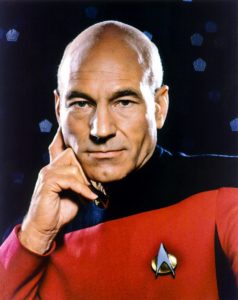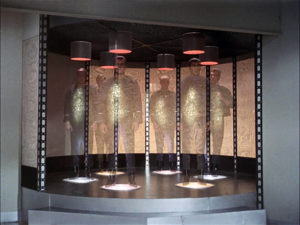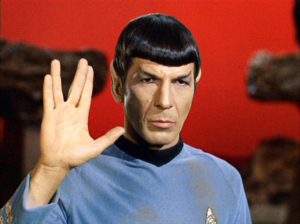“To Boldly Go Where No Man Has Gone Before!”
I’m not a trekkie! I’ve never been a Star Trek fan. I don’t particularly like science fiction. Back to the Future is as far as I go. To the trekkies out there, please don’t take offense. My family is full of Star Trek lovers. Believe me, I have viewed all iterations of Star Trek dating back to the 1960s.
What does Star Trek have to do with our reading this week? Let’s take a cosmic journey through my exploration of threshold concepts and troublesome knowledge.
“Compassion: that’s the one thing no machine ever had. Maybe it’s the one thing that keeps men ahead of them.” – Dr. McCoy
I don’t like ebooks. My first thought, “There is no way I can read these books online!” My eyes can’t take it and I easily get lost. How can an ebook ever be an efficient or enjoyable way to read a book? I quickly reached for my phone, tapped on my handy Amazon App, and was shocked to discover the first book was a hefty $59.95! I entered the portal…the brave new world of ebooks. I am grateful for my new travel companions. Inspectional and analytical reading skills, “Engage!” [1]
Here is what I discovered…
“Things are only impossible until they are not.” – Captain Jean-Luc Picard
The learning journey is going to require me to tolerate the uncomfortable feelings that accompany not knowing where I am, where I am going, or what I will find once I get there. I’m tackling a new course of study where the core concepts and next steps are not clearly understood. I quote Jesus for comfort, “For nothing will be impossible with God.”[2] My spiritual journey contains threshold concepts. I seem to be OK with that!
I get lost without a definition, “A threshold concept can be considered as akin to a portal, opening up a new and previously inaccessible way of thinking about something. It represents a transformed way of understanding, or interpreting, or viewing something without which the learner cannot progress.”[3] All subjects have troublesome core material that must be mastered. These are threshold spaces where hard to grasp concepts are not yet understood and present challenges to new learning. As a student, I must move through these spaces of discomfort in order to move forward with my learning. Thresholds are like portals. You never know where you will end up, but you have to go through the scary portal to get there.
“Beam me up, Scottie” – Captain James T. Kirk
When considering my NPO, to help ministry leaders safely connect with one another, I recognize that I am inviting them to experience threshold spaces that will be uncomfortable, uncertain, frustrating, require practicing new skills, and a different and more vulnerable way of being with others. It’s risky. Like Scottie, I want to be reliable, wise, and ready for any adjustments. I must enter threshold spaces first if I am going to help others brave new experiences. My question becomes, how do I help others see what I see… and beyond? How do I help ministry leaders see what they alone are designed to see? Good leadership is required of me. Compassion, humility, and deep listening are necessary tools.
“To seek out new life and new civilizations” – Captain James T. Kirk
Alien Knowledge? We don’t know what we don’t know. “Foreign or alien knowledge comes from a perspective that conflicts with our own. Sometimes the learner simply considers foreign knowledge wrong and makes no attempt to see or even recognize the knowledge as foreign.”[4] In other words, I have to be OK with being wrong, to ask questions with curiosity and wonder, to look at things from another person’s point of view, a different angle or lens, set aside judgments and prejudices, follow outrageous ideas, and risk new experiences. Alien knowledge is not wrong, it’s just different. My understanding broadens by considering new possibilities.
“It’s highly illogical” – Spock
I don’t speak Vulcan! Coming to terms with the vocabulary and the author is a significant challenge in research.[5] I thought I knew what words meant. Terms I understand in different contexts now have new meaning to interpret. This is one example of troublesome knowledge.
I never considered liminality as, “…a suspended state in which understanding approximates to a kind of mimicry or lack of authenticity (Palmer (2001).[6] Have I spent my entire academic life mimicking and not really thinking or learning? Familiar terms take on differently nuanced meanings and new sets of questions. For example, Meta Cognitions are my thoughts about my thinking. I must ask myself, What do I think about being in a threshold learning space? This might sound like, “I can’t do this therefore I’m stupid.” What do I think about those thoughts? Meta Affect is what I feel about my feelings. What are my feelings about tackling a threshold concept? I might feel anxious, bored, or excited. What might those feelings be telling me? Meta Experience is a new term for me. Meta Experiences are what the person experiences during the cognitive endeavor.[7] This might be my brain pinging with connections and ideas, and too much caffeine, or numbed out, distracted, fidgeting, or avoiding my studies for days. Self-regulation, a term I do understand, is an invaluable and learnable set of skills which come with new threshold experiences.
“To infinity and beyond!” Buzz Lightyear”
Oops, wrong show. Maybe I do like a bit of science fiction after all! Inspectional and analytical reading has made this assignment less overwhelming. I wondered if I could break my stubborn habit of reading every single word on every single page. Like Captain Kirk’s nemesis, Khan Noonien Singh, the ebook has been my nemesis. With Adler’s reading tools I may triumph in the end.
This doctoral program is a bold journey. I am making new discoveries, surprising connections, learning how to read smarter, work faster, take efficient notes, ask better questions, use unfamiliar technological tools, and think more critically. It’s hard work. Not in a million lightyears did I ever expect Star Trek to aid my learning journey! I now wrestle with the threshold concept of citing an ebook. Be patient with me. I’m still learning.
[1] “How to Read a Book: The Ultimate Guide by Mortimer Adler,” accessed November 2, 2022, 4. https://fs.blog/how-to-read-a-book/ p.4.
[2] Luke 1:37
[3] Meyer, Jan, F.H and Ray Land., eds. Overcoming Student Barrier to Student Understanding: Threshold Concepts and Troublesome Knowledge. (London, UK: Routledge, 2012), 3. https://georgefox.idm.oclc.org/login?url=https://www.taylorfrancis.com/books/9780203966273
[4] Meyer and Land, eds., Overcoming Barriers, 39.
[5] Adler, Mortimer J, and Charles Van Doren, How to Read a Book. (New York, NY: Simon & Schuster, 1940), 97.
[6] Meyer and Land, eds., Overcoming Barriers, 16.
[7] Ibid., 49.
All Star Trek quotes complied by TechRepublic.com https://www.techrepublic.com/article/20-star-trek-quotes-to-help-you-boldly-go-through-the-workday/
17 responses to ““To Boldly Go Where No Man Has Gone Before!””
Leave a Reply
You must be logged in to post a comment.






Jenny,
It is funny that both of our sci-fi imaginations were activated in this week’s readings. Doctor Who came to mind when I was reading about a portal and transformation. I resonate with your threshold concept of using ebooks. I like paper. The texture, the fragrance, the ability to mark up a page in color brings me great joy. Similarly, I have entered the portal of experiencing books through Hoopla and other apps for reading books online. When you mentioned the learning journey may present uncomfortable feelings of the unknowns, what have you found to be helpful for you in processing those unknowns? Thank you so much for sharing your new learning. I am hoping to learn how to cite an ebook (with the linked numbers) in the days ahead.
Cathy, Thank you for the question. First, I remind myself that I encounter unknowns everyday. Some just feel bigger, scarier, and more overwhelming than others. I spend a bit of time sorting out my feelings about that and recognize there are some things I will never know, or don’t need to know right now. I explore that and then let it go so I don’t end up heading down a pointless rabbit trail. Second, I remind myself that I am pretty good at finding lost things. Research and new understanding feel similar to me. There is a process and method, so I stick to that and if that doesn’t work, experiment with other methods. Third, I ask for help. A relatively new skill for me! Fourth, I am very comfortable with the truth that, “I know, that I know nothing.” Any new learning is a win even if a lot of trial and error is involved.
Jenny, you kept me laughing at the same time that you clearly explained your thinking. I agree, the term Meta Experience was a new term and yet instinctually I think it made sense. Of course we know from experience that if we’re distracted or sleepy we’re not going to track with difficult material. If our brains are “pinging with connections and ideas” we’re going to be motivated to continue reading and digging deep. This doctoral program is definitely a bold journey full of discoveries. I think we all need to be patient with ourselves as we tackle these threshold concepts!
Kim, I feel like I have a million yet to be mastered threshold concepts coming at me all at once. I am really trying to focus on the concept I need in the present moment and to complete the task of learning before I move on. I keep wondering about pacing. As hard as I try to pace myself and choose what is most important now, I still find myself a little panicked over what concepts I am missing. I’m learning to trust that the new knowledge I need will come at exactly the right time.
Jenny, this may win post of the semester so far. Well done running your reflections alongside a subject of which you aren’t too crazy about….the subject of trekkie-ness. Your approach to unpacking your conclusions was quite interdisciplinary, and you fully embraced a willingness to enter the “transformative” and “potentially troublesome” (Meyer and Land, 7) nature of a threshold concept. I resonated with your take on not speaking the Vulcan-like language of the subject. I think Charlotte Taylor captured a similar challenge in her chapter, “Threshold concepts in Biology,” highlighting the difficulty students have in learning the language of science while learning biological concepts at the same time, “which further compounds problems of understanding” (see Charlotte Taylor’s chapter in Meyer and Land’s book, page 94) in a new field of study.
Travis, You are too kind. After I hit publish I thought, “That was ridiculous and why did I just quote Captain Kirk!” Thank you for catching that I was exploring something I did not particularly enjoy while trying to sort out this week’s reading. It was actually a fun way to approach the topic. I keep reminding myself this doctoral program is fun even though troublesome at the same time! Thank you for highlighting the connection between the vocabulary of the subject while simultaneously learning the concepts of the new subject. This reading helped me understand why I struggled so much with math and science in high school. If the language of the subject didn’t make sense how was I ever going to grasp the concepts. I am learning to focus on vocabulary as I move forward.
I’m intrigued (and blessed) to discover how many students approached these book “inspectionally.” That admission is mentioned in a number of blogs thus far. I feel slightly bad that I didn’t confess in mine as well. My conscience needs to be clear so here I go: “OK, OK. I inspected the Threshold books. I didn’t read them front to back!”
Whew. I feel better already.
Like you Jenny, I too am grateful for Adler (and ebooks) on this front!
I appreciated two specific aspects to your writings this week:
1. You playfully connected your learnings to a popular narrative (ie: Star Trek). This was a “hand hold” that I found to be so helpful.
2. You concluded with the call for “patience.” So, so important! So, so needed.
John, They say, “Confession is good for the soul.” I am finding this academic journey very good for my soul in that I am finding safety and support in admitting I need help, have surprising thoughts and feelings about what this journey is requiring of me, and freedom to be my authentic self. I think that speaks to the safety I feel within our cohort and the program in general. Self-discovery is a threshold space! I am glad that I was not alone in completing an inspectional and hopefully analytical reading for this post
Thank you for tackling the “meta” concepts Jenny! It really does mess with your head a bit, but its a useful way of identifying what’s happening in our inner lives. It reminds me of what happens during meditation, when I finally notice the part of me that notices my brain going all over the place. (I think I said that right) Being aware of these inner workings helps with that “self-regulation” you mentioned. I know I am not always in tune with what’s happening on the inside, especially when I’m going from one meeting, service, event, deadline, etc. to the next! Thanks for the posts!
Adam, my husband talks about meta cognitions, meta affect, meta this and meta that all the time. And yet, I still struggle to keep it all straight. That may not be the best thing to admit as a counselor. It is confusing and amazing how God designed our brains. I wish we didn’t have to deal with the chaos swirling in our brains so often. It is a relief to find tools that help our brains calm down and our bodies self-regulate. I have been doing a lot of breath prayer this semester and I keep the cognitive triangle in mind to help me notice what is happening. What self regulation tools are in your tool belt?
Your description of what got you over the threshold to ebooks highlights your cost/benefit analysis that you quickly calculated that lead you to change. This makes me think about a concept we talk a lot about my change management circles: “what will be the motivation to change that will outweigh the motivation to stay the same?”
For example: I used to be a workaholic, until I became a mom. I calculated (albeit subconsciously) that the costs of not paying the amount of attention to my family that I wanted to outweighed the costs of not putting in the 11th hour at work.
Your call-out of this adds a new layer to my understanding of what I may have to wrestle with as we move through our threshold concepts. What are the costs of changing from my old ways of thinking to new ones? Thanks for that!
Jennifer, Your comment took me back to an economics class at the UW back in 1982. Cost/benefit analysis may be the only threshold concept I retained from that class. I have been using it for years. I only have so much time, money, and energy. Like you, I have to pick and choose what is the most important priority in the most important aspects of my life at any given point in time. I gave up the idea that I could do it all and all at once years ago. I figured that I might get close over time by keeping the moral of an old Aesop’s fable in mind, “Slow and steady wins the race.” I am not a sprinter. When I try to sprint everything falls a part, very fast. The older I get the more I embrace my limitations. My limitations are gifts that keep me focused and in the sweet spot that Camacho talked about last week.
“When considering my NPO, to help ministry leaders safely connect with one another, I recognize that I am inviting them to experience threshold spaces that will be uncomfortable, uncertain, frustrating, require practicing new skills, and a different and more vulnerable way of being with others. It’s risky.”
That is a helpful reminder. We aren’t the only ones crossing thresholds but those engaging with our NPO’s will also (hopefully) be crossing thresholds. When I was a young, feisty, solo pastor in Long Island I had an eighty-something year old church administrator who regularly reminded me to “bring people along with you.” She knew I wanted to make many changes, big changes, to the church. She believed in my and my vision for where we were going but she also knew her congregation. They would not step across any threshold without me walking alongside them the entire way. I could not run ahead and expect them to follow. The threshold of change was too great. They needed me to walk alongside them – even if I had already crossed the threshold before, I needed to circle back and bring them through with me. Dangit. That eighty something year old administrator was wise.
In the church where I currently serve I am constantly reminding myself to “bring them along with me.” It is also something that I will need to remember as I engage in this NPO.
Hi Kally, I truly believe that I have no business taking anyone to a place I haven’t been. I am also reminded that as I wrestle through my own threshold learning experiences that I have benefited most by wise guides who have not only gone through the thresholds, but remember how challenging and scary it is. Compassion, empathy, patience, and a belief in me that I could do it were greatly appreciated. I have also had experiences that were the exact opposite in which my threshold tasks were made harder and my learning process more confusing by those who didn’t take the time to understand where I was coming from or willing to support my learning journey. That was very discouraging.
Jenny, I can relate to “how to cite an e-book”! In some ways I feel very ready to encounter threshold concepts, but what I feel absolutely off kilter with is the writing and citing and use of technology! I’m not that old (I don’t think) but it’s been 18 years since I last was in school and my things have changed! I even consider myself fairly intuitive with technology but whoo…I’m hoping Scotty beams me up soon! I appreciated the way you worked through the Meta concept…How do you stop the spinning of that portal and find your way back to the micro level? Do we get to function on the micro level as Doctorate students?
Jana, I am still trying to sort out what it all means in our doctoral learning context. I looked up a few more definitions.
“In its most basic use, meta- describes a subject in a way that transcends its original limits, considering the subject itself as an object of reflection.” https://www.merriam-webster.com/words-at-play/meta-adjective-self-referential
I sense this is the invitation as we begin learning about leadership and engaging with our NPO.
“Macro thinking is a process that considers the interrelationships and dynamics among system components and the decision making throughout the operating system.”
https://onlinelibrary.wiley.com/doi/10.1002/9781118840900.ch5
As I look at my NPO, I am noticing some overlap and connections between disciplines. I keep think about Jason describing the overlay of maps. Looking at things through different lenses to get a clearer picture.
The micro is looking at the details, the small things, and making adjustments and changes to improve something. This is my definition:) I think there will always to be lots of micro thinking on this learning journey. My attempts to write this response prove that point! Even though I doubt I am citing the above definitions correctly.
P.S. Micro thinking is driving me crazy. I just noticed a mistake in my citations for this blog. I think my brain is ready to engage with meta thinking:) I am stepping away and getting my mind on other things for awhile!
It is fascinating to use the Star Trek analogy in your writing. I then imagined that as a student in this program, I was on a spaceship, traveling to a galaxy or dimension very different from my origin. I agree that we are not always right and perfect. There are times when we could be wrong. That’s what Coven said too. The most important thing is we always want to learn and try. We can learn from mistakes to build more systematic and constructive thinking to reach the portal.